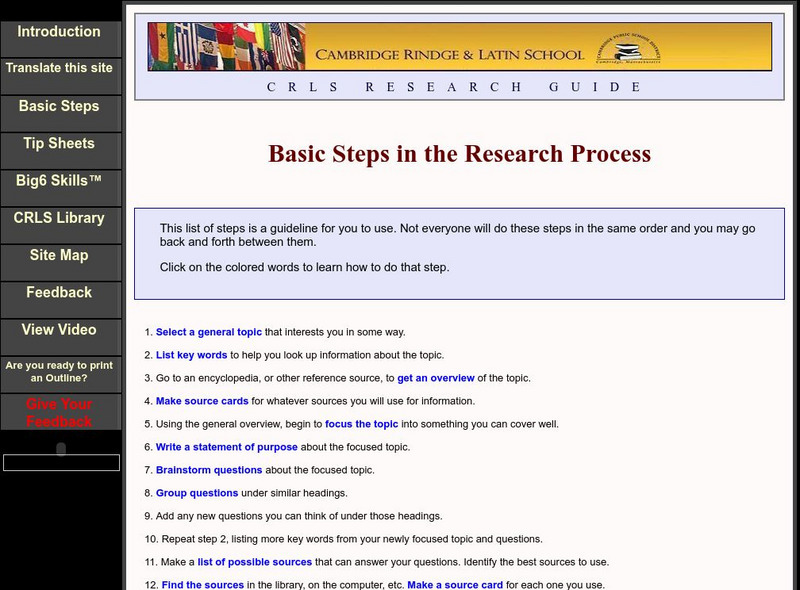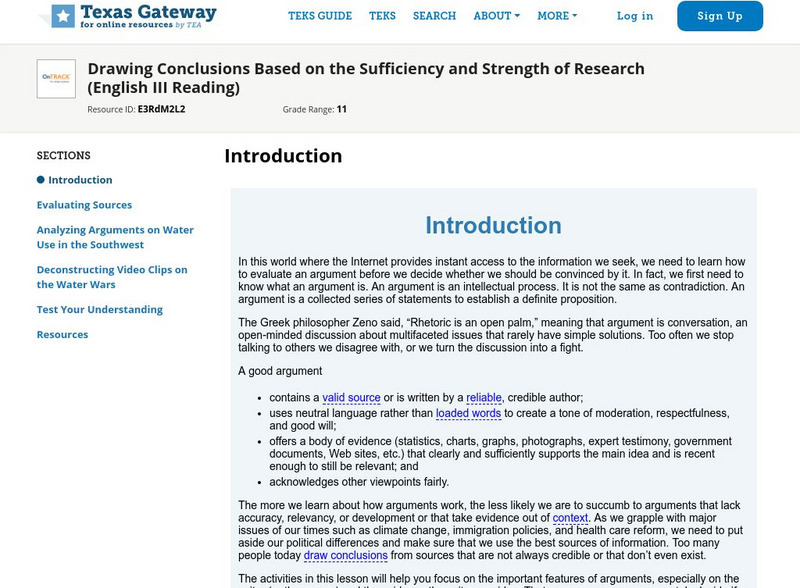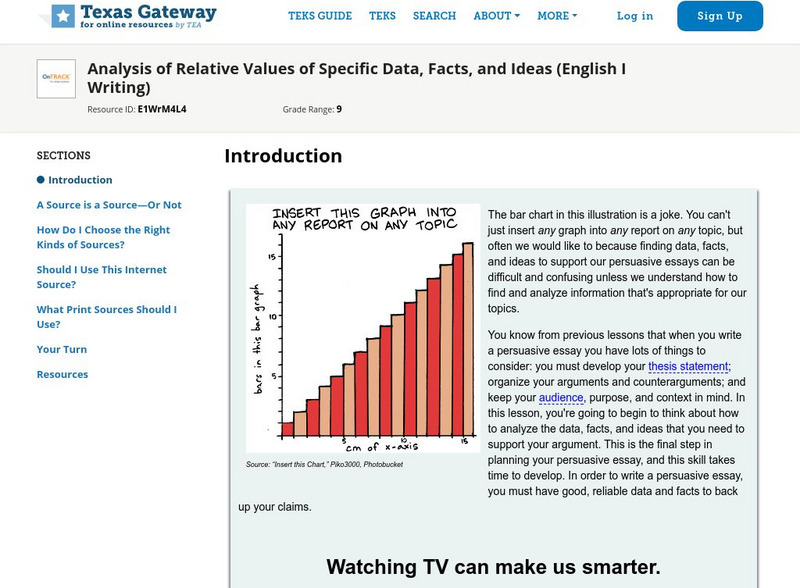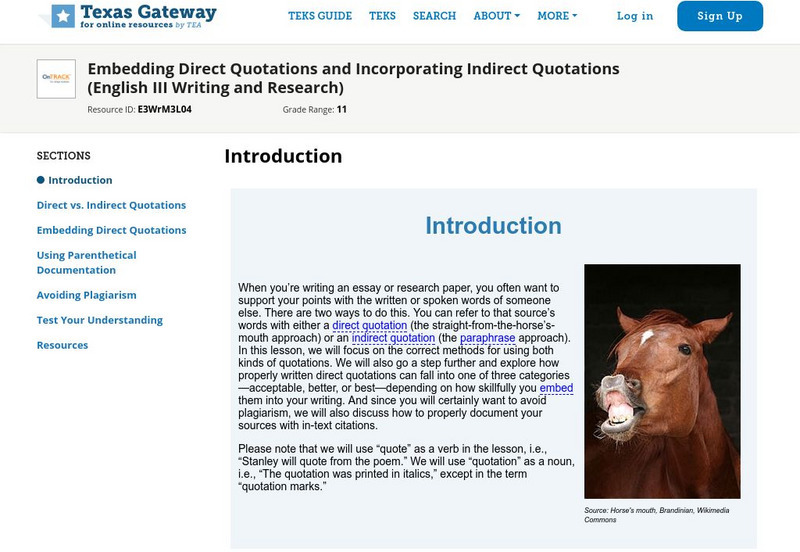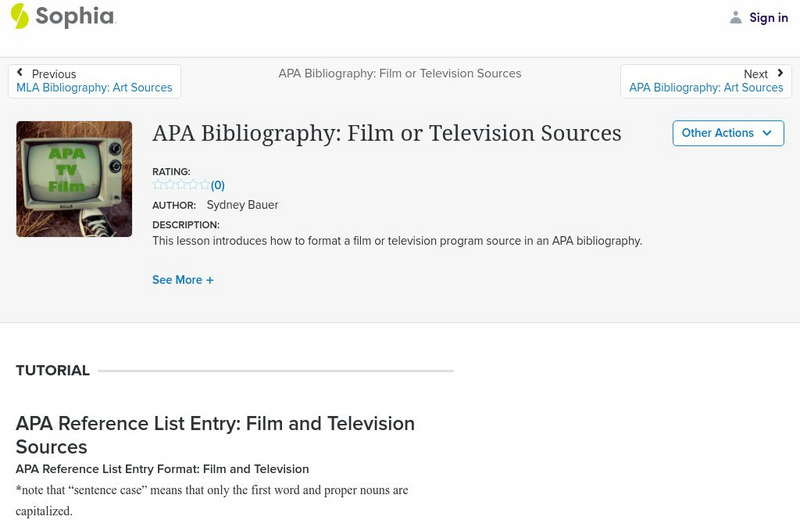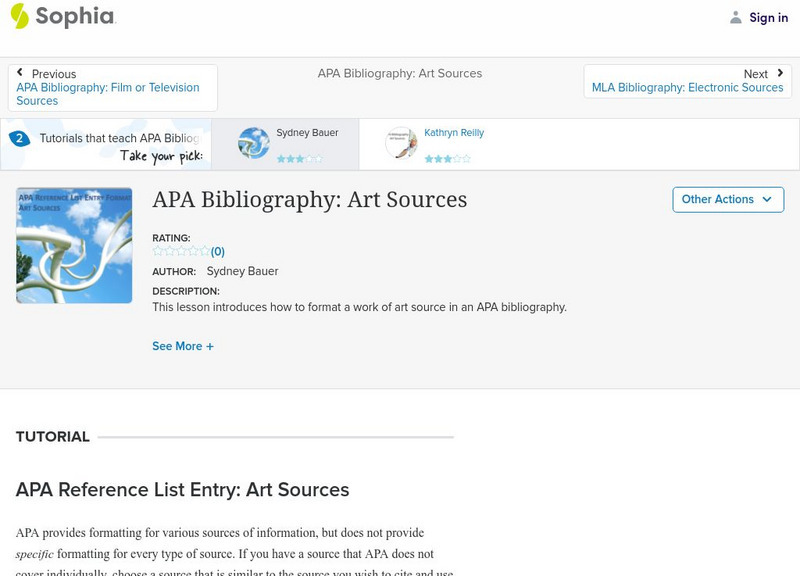Cambridge Rindge & Latin School
Cambridge Rindge & Latin School: Basic Steps in the Research Process
A comprehensive list of the important steps in researching and writing a report or project. Includes links to tip sheets for each step.
Other
Groucher College: Library Research Techniques for the Professional Scholar
This site provides clear techniques and guidelines on finding secondary and primary research for use in scholarly analysis that involves looking at the evidence and discovering a pattern that makes meaning.
University of North Carolina
University of North Carolina: Writing Center: Handouts: Evidence
What kinds of evidence best support the points you make in a paper? Where can you find the evidence you need? This handout answers all these questions and more, including the difference between primary and secondary sources. You'll also...
Online Writing Lab at Purdue University
Purdue University Owl: Avoiding Plagiarism
Plagiarism is a serious offense in many educational settings. Plagiarism and copyright laws are reviewed here. Activities to avoid plagiarism are also provided through links. W.9-10.8 Sources, W.11-12.8 Sources/Integrate/Cite;...
Online Writing Lab at Purdue University
Purdue University Owl: Using American Psychological Association (Apa) Format
Extensive information on how to use the American Psychological Association (APA) format for citations. Information is provided on general format, referring to other works, reference list, notes, and examples in the APA format. W.9-10.8...
Online Writing Lab at Purdue University
Purdue University Owl: Mla Formatting and Style Guide
Extensive examination of the Modern Language Association (MLA) format of writing papers, making reference to the works of others, citations, and notes. W.9-10.8 Sources, L.9-10.3a Standard Format; CCSS.ELA-Literacy.WHST.6-8.8 Gather...
Texas Education Agency
Texas Gateway: Documenting Sources and Writing a Bibliography/works Cited
This lesson focuses on documenting research sources and writing a bibliography or Works Cited page. It discusses when and how to document your sources using MLA style. W.9-10.8 Sources, L.9-10.3a Standard Format
Texas Education Agency
Texas Gateway: Drawing Conclusions on the Sufficiency and Strength of Research
The activities in this lesson will help you focus on the important features of arguments, especially on the writer (or the source) and the evidence the writer provides. That way, you can more accurately decide if an argument is valid and...
Texas Education Agency
Texas Gateway: Analysis of Relative Values of Specific Data, Facts, and Ideas
[Accessible by TX Educators. Free Registration/Login Required] This lesson focuses on analyzing and evaluating the value of the sources used for evidence in a research project.
Texas Education Agency
Texas Gateway: Embedding Direct Quotations and Incorporating Indirect Quotations
This lesson focuses on the correct methods for using both direct and indirect quotations. We will explore how properly written direct quotations can fall into one of three categories: acceptable, better, or best, depending on how...
Other
Oslis: Research Process
Excellent site outlining each step for Internet research for grades 6-12. This site focuses on writing a research paper from selecting a topic through to the final paper. Click on Cite My Sources to get the electronic citation machines....
Online Writing Lab at Purdue University
Purdue University Owl: Types of Sources
A list and explanation of different types of print and online sources. W.11-12.8 Sources/Integrate/Cite
Lumen Learning
Lumen: Using Sources: Using Online Citation and Reference Tools
This lesson focuses on using online citation tools and being aware that they make mistakes that must be corrected. W.9-10.8 Sources
Texas Education Agency
Texas Gateway: Citing Material Correctly (English Iii Writing)
In this lesson, students will learn how to decide when they need a source citation, how to cite sources using parenthetical information, and the differences among the citation styles.
Sophia Learning
Sophia: Avoiding Plagiarism: Lesson 2
This lesson goes over how to avoid unintentional plagiarism. It is 2 of 4 in the series titled "Avoiding Plagiarism."
Sophia Learning
Sophia: Apa Bibliography: Film or Television Sources
This lesson introduces how to format a film or television program source in an APA bibliography.
Sophia Learning
Sophia: Research Sources: Online Research Databases
This lesson discusses using research databases to conduct research.
Sophia Learning
Sophia: Annotated Bibliographies: Lesson 2
This lesson introduces annotated bibliographies. It is 2 of 3 in the series titled "Annotated Bibliographies."
Sophia Learning
Sophia: Apa Bibliography: Art Sources: Lesson 1
This lesson introduces how to format a work of art source in an APA bibliography. It is 1 of 2 in the series titled "APA Bibliography: Art Sources."
Sophia Learning
Sophia: Critiquing a Source
This lesson goes over how to critique a research source for reliability. W.11-12.8 Sources/Integrate/Cite


